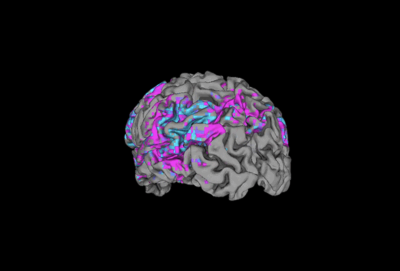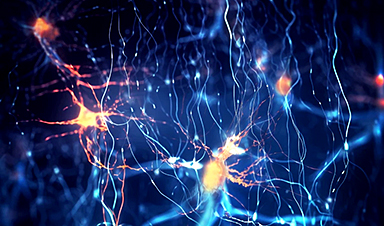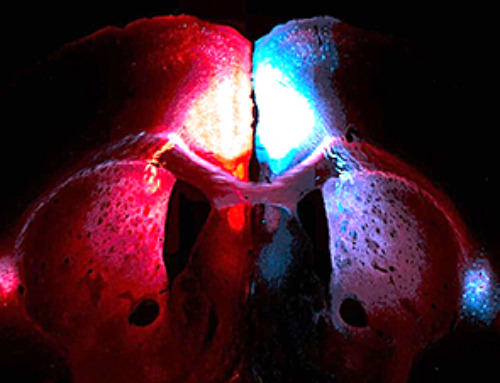By eavesdropping on the brains of living people, scientists have created the highest-resolution map yet of the neurons that encode the meanings of various words1. The results hint that, across individuals, the brain uses the same standard categories to classify words — helping us to turn sound into sense.
The study is based on words only in English. But it’s a step along the way to working out how the brain stores words in its language library, says neurosurgeon Ziv Williams at the Massachusetts Institute of Technology in Cambridge. By mapping the overlapping sets of brain cells that respond to various words, he says, “we can try to start building a thesaurus of meaning”.
The work was published today in Nature.
Mapping meaning
The brain area called the auditory cortex processes the sound of a word as it enters the ear. But it is the brain’s prefrontal cortex, a region where higher-order brain activity takes place, that works out a word’s ‘semantic meaning’ — its essence or gist.
Previous research2 has studied this process by analysing images of blood flow in the brain, which is a proxy for brain activity. This method allowed researchers to map word meaning to small regions of the brain.
But Williams and his colleagues found a unique opportunity to look at how individual neurons encode language in real time. His group recruited ten people about to undergo surgery for epilepsy, each of whom had had electrodes implanted in their brains to determine the source of their seizures. The electrodes allowed the researchers to record activity from around 300 neurons in each person’s prefrontal cortex.
As participants listened to multiple short sentences containing a total of around 450 words, the scientists recorded which neurons fired and when. Williams says that around two or three distinct neurons lit up for each word, although he points out that the team recorded only the activity of a tiny fraction of the prefrontal cortex’s billions of neurons. The researchers then looked at the similarity between the words that activated the same neuronal activity.
A neuron for everything
The words that the same set of neurons responded to fell into similar categories, such as actions, or words associated with people. The team also found that words that the brain might associate with one another, such as ‘duck’ and ‘egg’, triggered some of the same neurons. Words with similar meanings, such as ‘mouse’ and ‘rat’, triggered patterns of neuronal activity that were more similar than the patterns triggered by ‘mouse’ and ‘carrot.’ Other groups of neurons responded to words associated with more-abstract concepts: relational words such as ‘above’ and ‘behind’, for instance.

Mind-reading machines are here: is it time to worry?
The categories that the brain assigns to words were similar between participants, Williams says, suggesting human brains all group meanings in the same way.
The prefrontal cortex neurons didn’t distinguish words by their sounds, only their meanings. When a person heard the word ‘son’ in a sentence, for instance, words associated with family members lit up. But those neurons didn’t respond to ‘Sun’ in a sentence, despite these words having an identical sound.
Mind reading
To an extent, the researchers were able to determine what people were hearing by watching their neurons fire. Although they couldn’t recreate exact sentences, they could tell, for example, that a sentence contained an animal, an action and a food, in that order.
“To get this level of detail and have a peek at what’s happening at the single-neuron level is pretty cool,” says Vikash Gilja, an engineer at the University of California San Diego and chief scientific officer of the brain–computer interface company Paradromics. He was impressed that the researchers could determine not only the neurons that corresponded to words and their categories, but also the order in which they were spoken.
Recording from neurons is much faster than using imaging; understanding language at its natural speed, he says, will be important for future work developing brain–computer interface devices that restore speech to people who have lost that ability.
News
Scientists Crack a 50-Year Tissue Mystery With Major Cancer Implications
Researchers have resolved a 50-year-old scientific mystery by identifying the molecular mechanism that allows tissues to regenerate after severe damage. The discovery could help guide future treatments aimed at reducing the risk of cancer [...]
This New Blood Test Can Detect Cancer Before Tumors Appear
A new CRISPR-powered light sensor can detect the faintest whispers of cancer in a single drop of blood. Scientists have created an advanced light-based sensor capable of identifying extremely small amounts of cancer biomarkers [...]
Blindness Breakthrough? This Snail Regrows Eyes in 30 Days
A snail that regrows its eyes may hold the genetic clues to restoring human sight. Human eyes are intricate organs that cannot regrow once damaged. Surprisingly, they share key structural features with the eyes [...]
This Is Why the Same Virus Hits People So Differently
Scientists have mapped how genetics and life experiences leave lasting epigenetic marks on immune cells. The discovery helps explain why people respond so differently to the same infections and could lead to more personalized [...]
Rejuvenating neurons restores learning and memory in mice
EPFL scientists report that briefly switching on three “reprogramming” genes in a small set of memory-trace neurons restored memory in aged mice and in mouse models of Alzheimer’s disease to level of healthy young [...]
New book from Nanoappsmedical Inc. – Global Health Care Equivalency
A new book by Frank Boehm, NanoappsMedical Inc. Founder. This groundbreaking volume explores the vision of a Global Health Care Equivalency (GHCE) system powered by artificial intelligence and quantum computing technologies, operating on secure [...]
New Molecule Blocks Deadliest Brain Cancer at Its Genetic Root
Researchers have identified a molecule that disrupts a critical gene in glioblastoma. Scientists at the UVA Comprehensive Cancer Center say they have found a small molecule that can shut down a gene tied to glioblastoma, a [...]
Scientists Finally Solve a 30-Year-Old Cancer Mystery Hidden in Rye Pollen
Nearly 30 years after rye pollen molecules were shown to slow tumor growth in animals, scientists have finally determined their exact three-dimensional structures. Nearly 30 years ago, researchers noticed something surprising in rye pollen: [...]
NanoMedical Brain/Cloud Interface – Explorations and Implications. A new book from Frank Boehm
New book from Frank Boehm, NanoappsMedical Inc Founder: This book explores the future hypothetical possibility that the cerebral cortex of the human brain might be seamlessly, safely, and securely connected with the Cloud via [...]
How lipid nanoparticles carrying vaccines release their cargo
A study from FAU has shown that lipid nanoparticles restructure their membrane significantly after being absorbed into a cell and ending up in an acidic environment. Vaccines and other medicines are often packed in [...]
New book from NanoappsMedical Inc – Molecular Manufacturing: The Future of Nanomedicine
This book explores the revolutionary potential of atomically precise manufacturing technologies to transform global healthcare, as well as practically every other sector across society. This forward-thinking volume examines how envisaged Factory@Home systems might enable the cost-effective [...]
A Virus Designed in the Lab Could Help Defeat Antibiotic Resistance
Scientists can now design bacteria-killing viruses from DNA, opening a faster path to fighting superbugs. Bacteriophages have been used as treatments for bacterial infections for more than a century. Interest in these viruses is rising [...]
Sleep Deprivation Triggers a Strange Brain Cleanup
When you don’t sleep enough, your brain may clean itself at the exact moment you need it to think. Most people recognize the sensation. After a night of inadequate sleep, staying focused becomes harder [...]
Lab-grown corticospinal neurons offer new models for ALS and spinal injuries
Researchers have developed a way to grow a highly specialized subset of brain nerve cells that are involved in motor neuron disease and damaged in spinal injuries. Their study, published today in eLife as the final [...]
Urgent warning over deadly ‘brain swelling’ virus amid fears it could spread globally
Airports across Asia have been put on high alert after India confirmed two cases of the deadly Nipah virus in the state of West Bengal over the past month. Thailand, Nepal and Vietnam are among the [...]
This Vaccine Stops Bird Flu Before It Reaches the Lungs
A new nasal spray vaccine could stop bird flu at the door — blocking infection, reducing spread, and helping head off the next pandemic. Since first appearing in the United States in 2014, H5N1 [...]





















